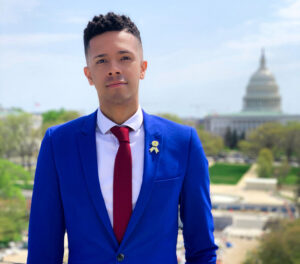
By Ashleigh Fields, Howard University News Service
Special to The Truth
The room fell silent as Brandon Wolf reflected on the loss that has shaped his life after surviving the 2016 Pulse Nightclub shooting in Orlando, Florida.
“I remember the hair jolting up on the back of my neck. I remember panic. I remember a sprint to the emergency exit,” Wolf recalled. “Some days I still feel like I can hear every one of the 110 rounds pumped into the club from an assault rifle.”
Wolf joined survivors of hate crimes from Atlanta; Buffalo, New York; Charleston, South Carolina; El Paso, Texas; and Pittsburgh who shared their personal experiences at the United We Stand Summit that the White House hosted for over 80 guests on Thursday. The event was designed to rally around public safety awareness and end hate-fueled violence in America.
“My best friends, our stolen loved ones aren’t just numbers or statistics,” Wolf said, describing the night that left 43 people dead and 53 wounded in Florida. “They’re missing faces at birthday parties. They’re empty seats at dinner tables. They are the human cost of hate violence.”
Shortly after he spoke, Vice President Kamala Harris recognized Wolf as a national leader for the work he’s doing as an activist to end LGBTQ+ hate crimes and gun violence. Then she shared the significance of the summit’s date.
“On this day 59 years ago, four white supremacists planted dynamite in the basement of the 16th Street Baptist Church in Birmingham, Alabama,” Harris said. “The blast took the lives of four beautiful little girls and injured a dozen more people including Sarah Collins, who is here with us today.”
In addition to Collins, the summit also included civic and civil rights leaders like the Rev. Al Sharpton, founder and president of the National Action Network; Randi Weingarten, president of the American Federation of Teachers; and Keisha Lance Bottoms, former Atlanta mayor and White House senior advisor for public engagement.
Throughout the day, elected and appointed officials spoke on panels while local changemakers or “uniters” engaged in conversations centered around bridging the gaps in the American community. Before the day concluded, President Joe Biden discussed his vision for the American dream.
“Look, I decided to run for president after Charlottesville, Virginia — literally not figuratively,” Biden said. “I thought to myself: ‘This is the United States of America. How could that happen?’”
“We give no safe harbor to hate,” Biden said. “In America, evil will not win. It will not prevail. Hate will not prevail. And white supremacists will not have the last word. And this venom and violence cannot be the story of our time.”
The president then appealed for social networking sites to be held more responsible for posts.
“I’m calling on Congress to get rid of special immunity for social media companies and impose much stronger transparency requirements on all of them,” Biden said.
In a pledge to end assaults, the Department of Homeland Security is providing $20 million in grants to fight violence.
“The funds will go to 43 local community organizations to build or strengthen their capacity,” said Alejandro Mayorkas, U.S. secretary of Homeland Security.
The National Telecommunications and Information Administration will also award up to $69 million from the Bipartisan Infrastructure Law to assist states, Tribal entities, and U.S. territories as they develop programs to improve digital literacy and online skills. The Departments of Justice, Homeland Security, Education, and Health and Human Services will release a summary of federal resources for parents, caregivers and community members designed to provide information on how to prevent bullying.
The National Urban League, Anti-Defamation League, National Action Network (NAN), League of United Latin American Citizens (LULAC) and Asian Americans Advancing Justice (AAJC) have promised to hold the Biden administration accountable for each statement made at the United We Stand Summit.
“The five of us wrote a letter to the White House asking for a summit,” Sharpton said. “Never can we remember the White House having a full-day session about racism, antisemitism, homophobia, xenophobia.”
“This has been a historic day, and I might say that it was beyond our expectations,” he added, “but this is the beginning, not the end.”
Ashleigh Fields is a reporter for NewsVision and HUNewsService.com.
